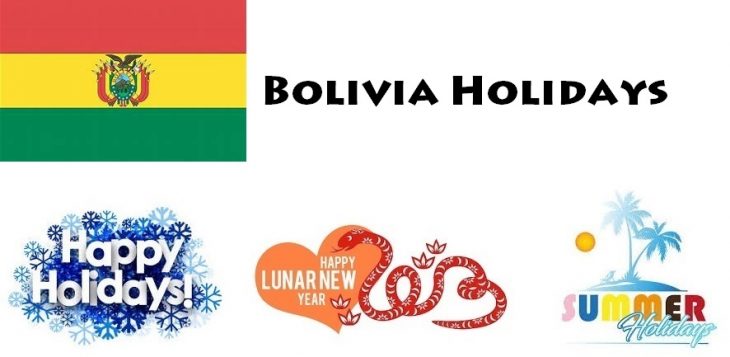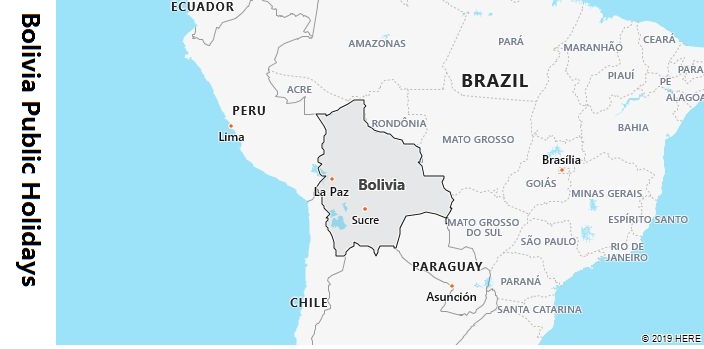Bolivia Public Holidays
Bolivia Public Holidays
Searching for the national holidays in Bolivia? All public holidays in Bolivia are treated like Sundays. This means that most of the Bolivia employees have a day off and all schools are closed on these office holidays. If you are planning a trip to Bolivia and want to know what the national and regional holidays are, check the details in the tables below.
New Year’s Day (January 1)
Overview
New Year’s Day, celebrated on January 1, marks the first day of the Gregorian calendar year and is one of the most significant public holidays in Bolivia. The holiday is a time for reflection, family gatherings, and the celebration of new beginnings. It is observed nationwide, and it is a day for rest and relaxation after the festive activities of New Year’s Eve.
Celebrations
In Bolivia, New Year’s Eve is celebrated with fireworks, parties, and gatherings, with many people enjoying a festive meal, typically with close family and friends. In some areas, traditions like burning effigies called “Año Viejo” (Old Year) are observed, symbolizing the burning away of bad memories from the previous year. On New Year’s Day itself, people rest, spend time with their families, and engage in activities that reflect on the year ahead.
Days Off
New Year’s Day is a public holiday, and most employees in Bolivia are given the day off. Government offices, schools, and businesses are closed, and people have the opportunity to relax and participate in social or religious activities with loved ones.
Carnival (Date varies)
Overview
Carnival is one of the most important and vibrant holidays in Bolivia, with celebrations that take place in the lead-up to Lent. The exact dates vary each year, as Carnival falls before the Christian observance of Ash Wednesday, but it typically occurs in February or March. Carnival in Bolivia is a fusion of indigenous traditions and Catholic influences, making it a unique cultural celebration.
Celebrations
Carnival is marked by massive parades, colorful costumes, music, dancing, and street parties. The most famous Carnival celebration in Bolivia takes place in Oruro, recognized by UNESCO for its cultural significance. The Oruro Carnival features a long procession of folkloric dances and costumes, with thousands of participants. In addition to Oruro, other cities like La Paz and Cochabamba also hold festivities. Traditional foods, such as “empanadas” and “salteñas,” are commonly enjoyed during the Carnival period.
Days Off
Carnival is a public holiday in Bolivia, and it is observed by most sectors, especially in regions where major festivities take place. The exact number of days off varies by region, but it typically includes Carnival Monday and Tuesday as public holidays. Government offices, schools, and businesses close, while people participate in parades and local celebrations.
Good Friday (Date varies)
Overview
Good Friday is an important Christian holiday observed on the Friday before Easter, commemorating the crucifixion of Jesus Christ. It is a solemn day of reflection and religious observance, widely recognized by the Catholic population of Bolivia. Good Friday is part of the Holy Week celebrations, leading to Easter Sunday.
Celebrations
On Good Friday, many Bolivians participate in religious activities, such as attending Mass and processions. In some areas, particularly in the Andean regions, there are reenactments of the Passion of Christ, where locals take part in a dramatic portrayal of Jesus’ final days. Good Friday is a day for spiritual reflection, fasting, and prayer, with many people observing a solemn atmosphere throughout the day.
Days Off
Good Friday is a public holiday, and most workers in Bolivia are given the day off. Government offices, schools, and many businesses are closed, allowing citizens to participate in religious services and reflect on the meaning of the day.
Labour Day (May 1)
Overview
Labour Day, celebrated on May 1st, is an important public holiday in Bolivia that honors workers and their contributions to society. The day is celebrated with a mix of political rallies, union marches, and various cultural events, advocating for workers’ rights and social justice.
Celebrations
Labour Day in Bolivia is marked by large demonstrations and marches organized by trade unions, political groups, and workers’ organizations. In La Paz, the capital, there are parades and speeches, with workers expressing solidarity and highlighting their demands for better working conditions. Labour Day is also a time for citizens to reflect on the labor movement and celebrate the accomplishments made by workers in the country. Festive events, including music and dance, are often a part of the celebration.
Days Off
Labour Day is a public holiday, and most employees are given the day off. Government offices, schools, and businesses are closed, and citizens use the day to participate in political events, attend parades, or relax with family.
Independence Day (August 6)
Overview
Independence Day is one of the most significant public holidays in Bolivia. It commemorates Bolivia’s declaration of independence from Spain, which took place on August 6, 1825. This day is marked with patriotic celebrations and ceremonies that reflect the country’s pride in its sovereignty and the progress it has made since gaining independence.
Celebrations
Independence Day is celebrated with military parades, cultural performances, and ceremonies attended by government officials, the military, and the general public. The main celebration takes place in the capital city of La Paz, where the President delivers a speech, and a large parade is held. Across the country, cities and towns hold their own parades, and people celebrate with music, dancing, and public gatherings. Independence Day is a time for Bolivians to reflect on their national identity and history.
Days Off
Independence Day is a public holiday in Bolivia, and most workers have the day off. Government offices, schools, and businesses close for the day, and citizens participate in celebrations, attend ceremonies, or spend time with family.
All Saints’ Day (November 1)
Overview
All Saints’ Day is a Christian holiday observed on November 1st. It is a time to honor and remember all the saints, both known and unknown, and is particularly significant for the Catholic population of Bolivia. This day is also a time to remember deceased loved ones.
Celebrations
On All Saints’ Day, Bolivians attend Mass and visit cemeteries to honor the graves of their relatives. It is common to see families gather at the cemetery to clean graves, place flowers, and offer prayers for the souls of the deceased. Many people also light candles and make offerings to commemorate their loved ones. In some areas, there are special processions or religious events held to celebrate the day.
Days Off
All Saints’ Day is a public holiday in Bolivia, and most people are given the day off. Government offices, schools, and businesses are closed, and people visit cemeteries or participate in religious ceremonies to honor the saints and deceased family members.
Christmas Day (December 25)
Overview
Christmas Day, celebrated on December 25th, is one of the most important religious holidays in Bolivia, particularly for the Catholic community. It marks the birth of Jesus Christ and is observed with both religious and family traditions. Christmas in Bolivia blends Catholic customs with local cultural practices.
Celebrations
In Bolivia, Christmas celebrations begin on Christmas Eve, with many families attending a midnight Mass to commemorate the birth of Christ. Afterward, families gather for a festive meal that includes traditional foods such as “panetón” (a type of fruitcake) and “lechón” (roast pork). On Christmas Day itself, people exchange gifts, spend time with family, and enjoy festive meals. In some parts of Bolivia, public events such as concerts or performances take place, celebrating the spirit of the holiday.
Days Off
Christmas Day is a public holiday, and most employees have the day off. Government offices, schools, and businesses are closed, allowing people to spend time with family, attend church services, or participate in community events.
Table: Public Holidays in Bolivia and Days Off
| Holiday | Date | Days Off | Groups of People Recognized |
|---|---|---|---|
| New Year’s Day | January 1 | 1 day off | All citizens |
| Carnival | Date varies | 2-3 days off | All citizens, especially in major festival regions |
| Good Friday | Date varies | 1 day off | Christian citizens |
| Labour Day | May 1 | 1 day off | All citizens |
| Independence Day | August 6 | 1 day off | All citizens |
| All Saints’ Day | November 1 | 1 day off | Christian citizens |
| Christmas Day | December 25 | 1 day off | Christian citizens |















































